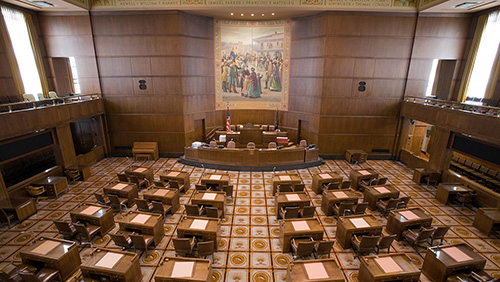In Oregon, as well as in other states, certain gambling losses can be written off by gamblers when they calculate their taxes. This could soon change, though, as lawmakers are considering a proposal that would take away those deductions. Casinos are, as to be expected, launching a fight to try and prevent the legislation from becoming law and the fight is being spearheaded by the Confederated Tribes of the Grand Ronde Community. It argues that the losses would be an encumbrance to their operations.

Oregon Senate Finance Committee Chairman Senator Mark Hass is behind the effort, Senate Bill 212 (SB 212). It has already been approved by the Senate, having successfully passed a vote this past March, and is now making its way through the House obstacle course. It is stuck in traffic in the House Revenue Committee.
This will give the tribe, which operates the Spirit Mountain Casino, time to rally the troops. It has joined forces with he Oregon Tribal Gaming Alliance (OTGA) in opposing the bill, hoping to thwart the efforts before the bill gains more momentum. According to the tribe, the result of the bill would mean serious reductions in its revenue. Last year, 2% of the gamblers on those machines accounted for 50% of the casino’s revenue.
If SB 212 were to be approved, gamblers would be more inclined to lower the amount they are willing to gamble. A lobbyist with the tribe told the Smoke Signals media outlet, “Nobody will gamble if they can’t write off their losses… The money from those customers goes toward us being able to provide essential governmental services.”
Some of those services include the state’s education programs, health care, public safety and cultural resources, according to the chairman of the OTGA, Gary George. He told House Speaker Tina Kotek, “Tribal gaming revenue is key to Oregon’s rural economy.”
Almost $151 million in earnings from gaming went to tribal government services and $98.6 million to tribal community services through 2015, according to the OTGA.
Under Oregon law, gamblers can deduct gambling losses when calculating taxable income, but only up to the amount that they won. This is similar to regulations established on the federal level by the Internal Revenue Service.
Some tribes in the state, such as the Coquille, have been looking to expand their operations in Oregon. The Coquille have already put the ball in motion to launch a casino in Medford, but SB 212 could derail those plans.
Hass believes that the deduction costs the state as much as $6 million in revenue each year. However, perhaps there’s a better answer. Oregon is considering sports gambling legislation, which could be ready within the next year. That should provide a substantial source of revenue and help the state overturn the $27 billion deficit needed to pay the unfunded pension program.